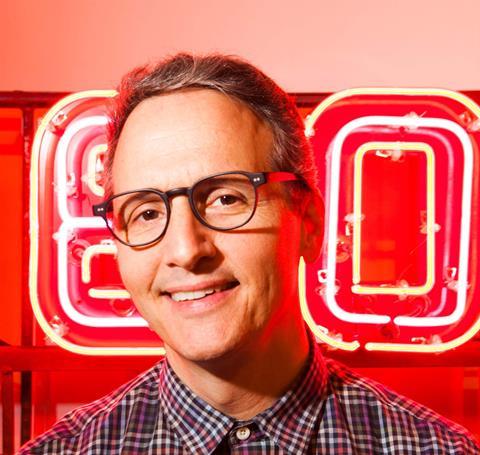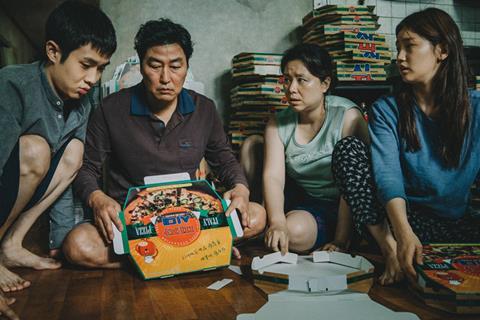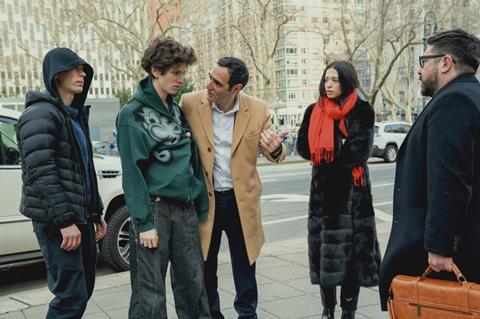Gunning for a sixth Palme d’Or in a row, Neon’s track record in the Cannes Competition isn’t just extraordinary but reflects the rapid rise of a savvy global player that is also coming off its biggest ever release in Longlegs and five Oscar wins for Sean Baker’s Anora. The company’s founder and CEO Tom Quinn talks to Screen.

Call him the Palme d’Or whisperer. In the eight short years since Tom Quinn founded Neon, the US company has dominated Cannes, claiming the festival’s top prize in each of the last five editions, most recently with eventual multiple Oscar winner Anora in 2024.
Quinn has been coming to the Croisette in various roles for more than two decades and insists he never knows who will win the Palme d’Or. This year he is bidding to make it six in a row. Neon, majority-owned by 30West, has two films in Competition — Julia Ducournau’s Alpha and Joachim Trier’s Sentimental Value — alongside Cannes Premiere selections Orwell 2+2=5 from Raoul Peck and Splitsville from Michael Angelo Covino. Splitsville is a Neon production and the company boarded the other films at script stage.
On the eve of the world’s biggest film festival and on the back of Neon’s most successful year, in which Osgood Perkins’ R-rated horror film Longlegs became its biggest ever release, Quinn talks to Screen International about all things Cannes, building his company alongside trusted executives, pushing deeper into production and launching the international sales division, whose Cannes slate includes Takashi Miike’s Bad Lieutenant: Tokyo, and Mads Mikkelsen action thriller Sirius.
As a cinephile, how do you regard Cannes’ status in the festival world as a meaningful curatorial and cultural voice?
I’ve been going to Cannes for 25 years and the festival is steeped in history. You see it all around and in the photos at the Grand and Carlton of stars arriving for a premiere by boat. There’s a certain grandeur and red carpet pageantry that only exists in Cannes. You walk into the Lumière, which is one of the grandest theatres in the world — and not a bad seat in the house — and when you see the festival logo and look back at the steps descending towards the sea, it feels sacred.
Cannes has been good to Neon. Do you feel pressure to get a result each year, like an acquisition or an award?
The result for us was always being in Competition: to be invited to Cannes and to seriously consider this selection of films from auteurs all over the world that will give us some of the best cinema we will see that year, and therefore we see that as the best replication of quality cinema in the marketplace.

The idea of winning was never the plan, because for 20 years I never won. The only time I ever came close was with Melancholia [in 2011]. The train sort of went off the tracks at the press conference [when director Lars von Trier made comments about Nazis, Jews and Hitler], but I honestly thought for about 12 hours there, we were on our way to winning the Palme d’Or. Parasite [in 2019] at Neon was the first time it happened in my career. Each subsequent year we’ve had at least two films in Competition, sometimes three, and the majority were bought at script stage. It’s honestly been a surprise every time we’ve won the Palme d’Or.
Cannes has been an excellent representation of quality American auteurs, whether it was Sex, Lies, And Videotape by Steven Soderbergh, Pulp Fiction by Quentin Tarantino or David Lynch’s Wild At Heart. Sean Baker’s Anora fits very much into that category.
After Anora made it five Palme d’Ors in a row last year, do you think about winning a sixth and is that a distraction?
It’s not a distraction. Haters gonna hate. If we’d only won one in the last six years, I would be ecstatic. The best part of all of it is cinema has won unilaterally. Thierry Frémaux and the selection committee at Cannes have also won. These films have gone on to do incredible things around the world. I hate to say the pressure might be more on them than it is on us.
When did Neon board each of the Palme d’Or winners?
Parasite [2019] and Titane [2021] at script stage, Triangle Of Sadness [2022] and Anatomy Of A Fall [2023] we bought on the ground in Cannes. And we bought Anora at script stage.
Did you ever think you had a winner on your hands?
Never. I wish I could be more brazen about our belief. I always thought someone else was going to win. The only year I thought we could win was Titane. I had a sense about the jury and I had seen a lot of the films. You can’t question Julia’s brilliance and where she’s taking cinema. I hadn’t seen something like that in more than 20 years. People are going to be very excited to see her new film Alpha. She is doing something wholly different, again in Competition. We also have Joachim Trier’s film [Sentimental Value] in Competition. Ironically both these filmmakers were in Competition together last time. When Julia won with Titane, Joachim had The Worst Person In The World in Competition.

Have you gone to the awards ceremony in each of the last five years?
By accident I stuck around for Parasite and we won. And so every year, being a little superstitious, I have stuck around, but I haven’t been to the awards show. I watch it up in the breakfast nook on the second floor of the Hotel Splendid with a couple of friends on a computer. It’s a surprisingly cosy and quaint Cannes spot I affectionately call ‘Granny’s attic’. It’s been hilarious because then you put on your tuxedo and go to the after party.
Which Cannes festival films have you bid on that got away?
So many regrets and open wounds. The most recent one was The Substance, which we fought hard for, but credit to Mubi who won out.
It must help that you’ve worked closely with your president of acquisitions and production Jeff Deutchman for many years.
Jeff has had a hand in our success. The whole team has been the same that’s been here since inception. Jeff’s team is exceptional. We’re eight years old and our VP of acquisitions Sarah Colvin, who bought Robot Dreams and The Seed Of The Sacred Fig, started at this company as an intern out of NYU. There’s a growing contingency of younger VPs at this company that are ready to take on a whole new challenge.
Is Cannes the number-one awards season festival launchpad today?
All the A-list festivals are majors for us: Sundance, Berlin, Cannes, Venice, Telluride, Toronto, New York. Even some of our regional festivals: we just bought Nirvana The Band The Show The Movie, a pure discovery out of SXSW. Every festival is an opportunity to buy, but our most high-profile successes started in Cannes and ran the fall circuit, which would include Telluride, Toronto and New York.
How important is that Palme d’Or to kick off an Oscar campaign?
Cannes means a lot. It’s been a self-fulfilling prophecy of what these films have represented, starting with Parasite winning the Palme d’Or and its global box office and awards season success. In subsequent years each film has leant additional credibility to what that award means. You follow that up with Titane and Julia Ducournau, one of the most exciting directors in the world, bending genre to her will. And then you combine the Oscar nominations for Triangle Of Sadness and Anatomy Of A Fall — both received best picture, director and screenplay nominations, and Anatomy Of A Fall earned a couple more and won best screenplay — and now you have the fifth Palme d’Or winner in Anora and its multiple Oscars success. That’s powerful and it’s had business ramifications for us because that award means a lot in [the US].
Can you go deep into awards season with another Cannes prize?
Yes. Portrait Of A Lady On Fire won screenplay [in Cannes], and so did The Substance. Koji [Yakusho] from Perfect Days won actor. Song Kang-ho won actor for Broker. Those movies show up in one capacity or another at the end of the year and are relevant.
How do you gauge audience appetite for the Palme d’Or winners?
We test all our movies. In Los Angeles we go to AMC Burbank. One of the reasons why these audiences came to see these movies is the Palme d’Or — it’s moved up from reason number six, five, all the way to number one for I believe the last three Palme d’Or winners that we have tested.
Tell us about expanding Neon’s production pipeline, which has ranged from Infinity Pool, Cuckoo, It Lives Inside, The End, to the upcoming It Follows sequel They Follow and I Love Boosters?
We have taken a very slow, methodical approach. The first film that we financed from inception was In The Earth by Ben Wheatley, which was the first film that shot post-Covid in Britain. We started at a microbudget level and have worked our way to more than $20m. It’s taken three years for us to get to this point and is super exciting to have learned on the job and grow with our directors, discovering them in some cases as acquisitions and moving on to their sophomore features.
It’s hard to buy a good horror movie on the open market or find the kind of quality that would befit a Neon action film or romantic comedy. You have to make those. That doesn’t mean they don’t exist but they’re very rare, and so the opportunity to produce and develop has given us this exciting new strand of films that we simply have not had access to, certainly not in the way we would want to make them.
What’s in the pipeline?
We have The Wrong Girls directed and written by Dylan Meyer starring Kristen Stewart and Alia Shawkat, one of the first features to go into production in Los Angeles after the fires. We just finished Splitsville from Michael Angelo Covino of The Climb. It stars Adria Arjona and Dakota Johnson and is in Cannes Premiere. We’re about to begin post on Boots Riley’s I Love Boosters. These have all been long pursuits of ours. We chased Boots since we saw Sorry To Bother You in Sundance [2018]. It’s an incredible cast and we’ll probably see it next year.
What is the budget on I Love Boosters?
In the lower 20s.
What can you tell us about the collaboration with Nicolas Winding Refn?
Not much yet except that I pre-bought Nic’s Only God Forgives [in 2012 as co-head of RADiUS] and it’s been my dream to make a movie together. The new collaboration Her Private Hell has an exceptional cast and Sophie Thatcher came on board first.
How has Neon’s production push expanded the company?
It has doubled in size in the last couple of years. We had an incredibly successful year in 2024, and 2025 has been going well, and that’s in large part due to production growing and the company being in a position to consistently tackle wide releases beyond an ad-hoc basis. You remind people that we did as large a movie as I, Tonya six months after the company launched, with 12 people. We’re really no different today than we were then. The difference is that we can do that more consistently. We are approximately 65 people today in New York and Los Angeles.
We are punching above our weight and have our hands in a lot of productions. To seriously be in the production business, you need the facility to maintain all the day-to-day legal and finance and structural aspects that come with it. It’s a real credit to Ryan Friscia, our CFO, and Emily Thomas, our lead counsel, who have been here running that and we also have a special relationship with Allison Carter and Jon Read from Savage Rose Films, who have been working on all of our productions for two years now [under a production and development partnership with Neon].
Were your production ambitions part of the impetus behind Neon’s sales operation?
Creating the model has been very dependent on us taking full charge of our destiny and launching our foreign sales company. We’ve needed [a sales business] since 2020. We’d been working with well-heeled sales companies and we were waiting for the right individual to run our own. I met Kristen Figeroid [Neon’s president of international sales and distribution, formerly of Sierra/Affinity and Endeavor Content] at the Zurich Summit and we were on our way. She hit the ground running and will have a very large slate in Cannes.
Does the ability to buy worldwide rights make you more competitive in the market?
Absolutely. We’d previously bought other films for the world like Apollo 11 and Assassination Nation. With Kristen here, we bought Steven Soderbergh’s Presence at Sundance, and we’ve replicated that with movies like Together [by Michael Shanks], which was the largest acquisition in Sundance [this year]. We are in a unique position to offer the kind of release that a lot of adventurous young filmmakers want. We’re focused on taking big steps with our campaigns and being highly creative on the marketing side, while ensuring these films are set up at like-minded independent distributors around the world.
What’s the split on in-house and third-party sales titles?
On the domestic slate, it’s 50-50 on average and that’s our goal. We’re in pursuit of auteur-driven cinema that has a very clear voice. We’re agnostic about genre, country of origin and size, and we’ve simply applied that to production.
Does your pay-1 partner Hulu underwrite or contribute significantly to your acquisition offers?
Everyone has a pay-1 partner. It’s monetised based on box office, size of release. They’ve been a great partner from the beginning.
How do you maintain discipline and manage risk while building a sustainable company?
It’s incredibly important that the industry moves away from the obsessive, hyper-focused expectation that each film must be profitable. Not every film is going to be profitable. We’re dedicating ourselves to something that is larger than any single film, to providing some of the best cinema the world has to offer a discerning audience. If you play the longer game, it’s easier to be successful and take creative risks.
There was a lot of talk about windows and PVoD at CinemaCon in Las Vegas. What’s your view?
Shortening windows is a mistake. Not every film should be released with a 17-day PVoD window [which Universal Filmed Entertainment Group announced in 2020 for smaller releases]. It can work for certain movies, but others should be released with a 120-day trajectory, 180 days, 45, 38. Each film merits a bespoke release pattern, and that then dials down into price point. Not all films should go onto PVoD. Some just aren’t worth the PVoD price — the audience has a real price resistance and you’ll simply evaporate in the digital ether and never track in the top 10. If you price it right, you can continue to build momentum.
I believe the 17-day window approach, consistently, does erode the theatrical window. But the idea that somehow [experimenting with PVoD] has been a new idea since 2020 [is incorrect]. The independents were there in 2006, whether it was us at Magnolia, or IFC, experimenting with VoD pricing, VoD windows simultaneous with theatrical in ways that we haven’t done since. In my career, that culminated at RADiUS when we were able to put theatrical exhibition in the same room as some of the larger cable providers and came up with the idea of letting the audience decide where they wanted to see a film and go with what made the most sense for theatrical and for VoD.
That culminated in an incredible release model for It Follows. The VoD was set up to premiere earlier than 17 days, but in theatrical success, that window would be delayed. The Thursday night opening sneaks for the film were so strong that we delayed the VoD and moved to a wide 90-day theatrical window and grossed an impressive $14.6m.

You said Anora would get to eight figures on PVoD, did it?
It did happen.
Can you share a number?
No, I will not. It did happen and the Oscar bump is very real [theatrically and on PVoD].
You said you set a goal of six Oscar nominations for Anora last July. Do you always plan that far ahead?
No, but you don’t always have the goods that early. We knew we could be a real threat to win best picture and all of that lined up very early for us. Stressful, but we persevered. It affirmed that cinema matters, and cinema matters come awards season. What we’ve done proved that. It’s also important to remember — and Christina Zisa [president of publicity] who runs these awards campaigns knows this better than anyone — that it’s a marathon, and there will be bumps in the road. Nominations are one thing, but the awards are merit-based. Sean Baker, Mikey Madison, five awards, five incredible opportunities from following your dream, believing in something as radical and as old-fashioned as cinema. I don’t know that we would be there had we not experienced other tough lessons along the way.
Such as?
On Parasite we thought we could be a multi-category contender throughout the campaign. After the SAG ensemble win, I thought we could win best picture. We learned other bellwethers along the way: the canary in the coal mine is the editors branch [of the Academy] — very impactful.
France not selecting Portrait Of A Lady On Fire [as its Oscar submission] — that traditionally has been a roadblock for serious Academy consideration. We got the Golden Globe nomination, but we were not able to secure anything else. But the experience 100% informed what was going to happen with Anatomy Of A Fall. We believed in that film and winning the Palme d’Or gave us a leg up. The morning after we were not selected as France’s submission, we publicly proclaimed that Anatomy Of A Fall was eligible for best picture, best director, best actress and best screenplay… but unfortunately not best dog.
Does the Academy rule change requiring members to watch all nominated films in order to vote in the final round help a company like Neon?
It’s a great thing. I’ll give credit to the voters. There’s a real honour code, because if you read a lot of [anonymous interviews] with voters, they’ll abstain from certain categories where they didn’t see all the movies.
Our audience skews younger and international and you could quickly assume there’s a large portion of voting members that fall right into those two groups. They’re active, they watch everything, and they vote vigorously. This is simply an encouragement for all Academy members to do the same.
























No comments yet